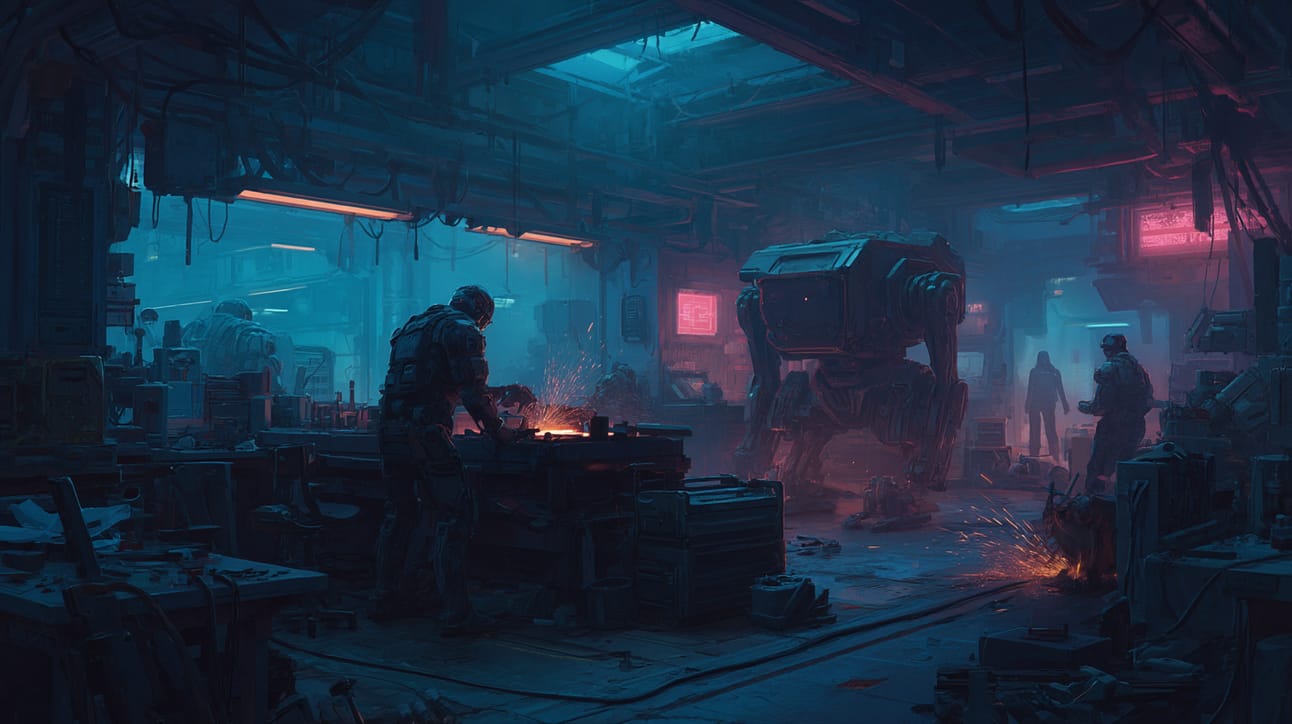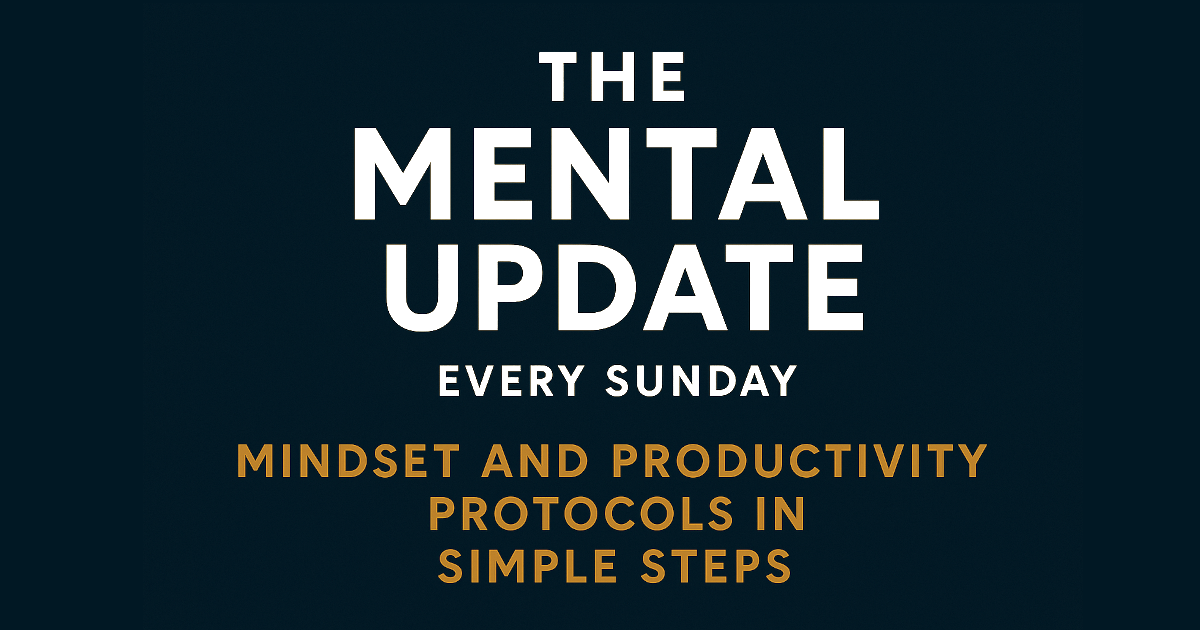- The Mental Update
- Posts
- The Mental Update: The Work You Can’t Not Do
The Mental Update: The Work You Can’t Not Do
How to find your thing and stick to it forever
Hey,
This week’s writing hit a little deeper than usual, not because it was louder, but because it was quieter.
You’ll notice a common thread: the work that sticks isn’t always strategic. It’s compulsive. It pulls you in when no one’s watching. It shows up in what you Google, what you explain too passionately at dinner, and what you’d do even if no one ever paid you.
From finding your lane without a plan to recognizing the thing that feels like play to you and work to everyone else, these pieces aren’t about chasing success. They’re about finally accepting the signals you’ve been sending yourself for years.
What follows isn’t advice. It’s reflection. Permission. And maybe a nudge back toward the thing you keep leaving, even though it’s always been yours.
The One Question That Helped Me Find My Life’s Work

Most people look for their path in spreadsheets and strategy decks.
I found mine in a simple question:
“What would I do for free every day, forever?”
No business plan. No monetization angle. Just raw instinct.
My answer? Researching and writing about the books I read.
Not just reading, I mean obsessively annotating, connecting ideas, distilling insights. I’d get lost in it. I didn’t need motivation. I needed time.
That question revealed my compulsion, not just my interest. And here’s the difference:
Interests fade when life gets loud.
Compulsions stay with you like a heartbeat.
When I followed that thread, everything else aligned. I started posting my notes online. People found value in the distillations. Some followed, some shared, some paid. The value grew because I never burned out.
I wasn’t chasing opportunity. I was deepening alignment.
Why this works
Your unconscious mind is already drawn to your lane. The problem is, you keep ignoring it in favor of things that “look smart.”
But if you stop long enough to ask this question, and answer honestly, you’ll find your work. The kind that energizes you instead of draining you.
So go ahead. Ask it:
“What would I do for free, every day, forever?”
Then prove you meant it by doing it tomorrow.
Most People Overthink Their Niche, Here’s the Simple Way to Find Yours

You don’t need a niche strategy. You need to pay attention.
Because the truth is, you’re already doing your thing. You’re just not calling it what it is.
If you looked closely at how you spend your time when no one’s watching, you’d find a pattern. A rabbit hole you keep returning to. A theme in your browser tabs. A topic you explain to friends with way too much enthusiasm.
That’s your signal. But instead of following it, you talk yourself out of it:
“It’s not valuable enough.”
“Nobody would care.”
“This isn’t a real niche.”
So you go niche-hunting on the internet. You copy other people’s paths. You brainstorm until it hurts.
And now you’re stuck with a “niche” you don’t care about, wondering why it doesn’t grow.
What works better?
Start with what you do naturally.
What do you explore without needing a reason?
What conversations do you always want to have?
What problems do you secretly love solving?
Then show up online and document that exploration.
You don’t need to be an expert. You need to be honest.
Your real niche isn’t something you choose. It’s something you finally accept.
You Already Know What You’re Good At, You’re Just Distracted

You don’t need more clarity. You need fewer comparisons.
Every time you scroll past someone succeeding at something shiny, your brain whispers:
“Maybe I should be doing that.”
Suddenly, you doubt your path. You start researching new ideas, sketching new projects, fantasizing about pivoting.
But here’s the truth:
You’ve already found your thing.
You just keep walking away from it.
How to know it’s your thing?
You return to it without being told.
You lose time while doing it.
You feel more like yourself in the process.
But when you chase someone else’s thing, even if it’s working for them, you start from zero. No momentum, no compounding, no joy. Just hope and imitation.
And worst of all: you dilute the one path that actually fits.
Focus is not about gritting your teeth. It’s about remembering what matters.
Look at your history. Look at your patterns.
There’s a skill, a topic, a rhythm that keeps showing up.
That’s your work.
You don’t need to find it.
You need to stop leaving it.
If You’re Still Searching for Your Passion, Stop Trying to Monetize It First

Here’s a trap:
You finally find something you love doing, and within a week you’re asking:
“How do I turn this into income?”
That’s how passion gets strangled before it has a chance to breathe.
You don’t need a monetization model on day one. You need momentum.
The early stage is about depth, not deals.
It’s about doing the thing often enough that it becomes part of your identity.
Why rushing to monetize is a mistake
You turn joy into pressure.
You skip the discovery phase and go straight to packaging.
You chase what sells instead of what satisfies.
Every artist who went pro started as an amateur who couldn’t stop.
You have to fall in love with the doing before you ask it to pay the bills.
I didn’t start selling anything until I’d been posting for months.
Only after consistently sharing book notes and distilling ideas did I start getting signals that they were valuable to others.
Three months in, the feedback was loud enough that building something for the market made sense.
By then, I had proof of value and the clarity to fulfill a real demand, not a hypothetical one.
Let your craft mature before you charge for it
Give your passion time to become a skill.
Let it surprise you with how useful it is to others.
Then, and only then, figure out how it wants to be monetized.
Your Specialty Is the Thing That Feels Like Play to You and Work to Everyone Else

You’ve probably been overlooking your edge.
Because it doesn’t feel like hard work.
It feels... easy. Natural. Even fun.
So you assume it can’t be valuable. You think, “Everyone can do this.”
But they can’t.
Your specialty is often the thing you underestimate, because it’s never felt like effort to you.
Here’s how you know it’s your lane:
You do it without being asked.
You lose track of time while doing it.
People say, “How did you even think to do that?”
For me, that was reading and distilling books.
What started as a private obsession became a public asset, but only once I recognized it was an asset.
The ease you feel isn’t a sign to dismiss it. It’s a sign you’re aligned.
It means you’ve found the intersection of:
Natural skill
Genuine joy
Public value
Stop downgrading your gifts just because they’re second nature.
That’s the zone you double down on.
Because when you stay in that place long enough, it compounds.
The skill sharpens. The output scales. The signal gets stronger.
And one day, people will call you the best at the thing you used to take for granted.
So, here’s your gentle reminder:
You don’t need a niche. You need alignment.
You don’t need more clarity. You need to stop comparing.
And you don’t need a strategy to start. You just need to listen to what keeps calling you back.
What part of this week’s insight hit home for you? Just reply, I’d love to hear it.
Until next time,
Daryl
P.S. Know someone who’s searching for their “thing”? Share this edition with them or send them here:
Also if you found value in The Master Key Made Easy, check out the ebook which gives all 24 lessons in a single convenient medium:
